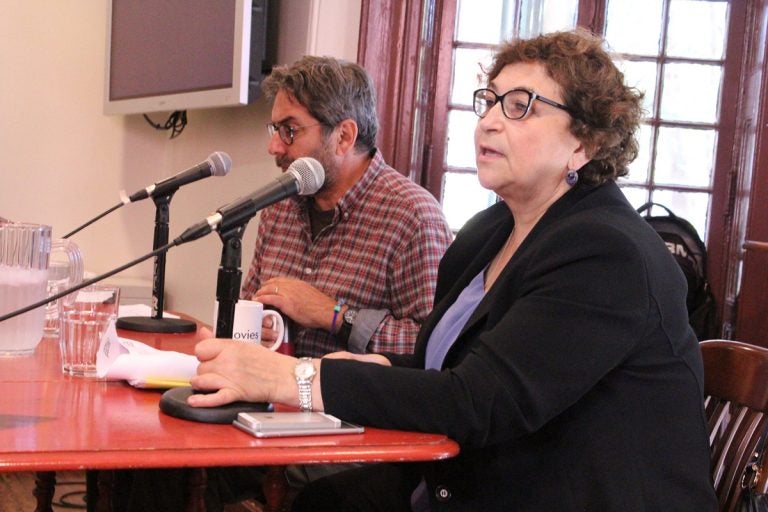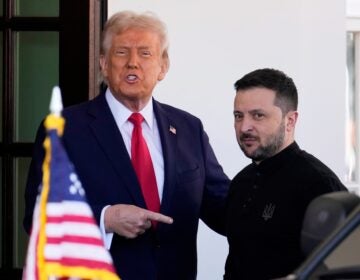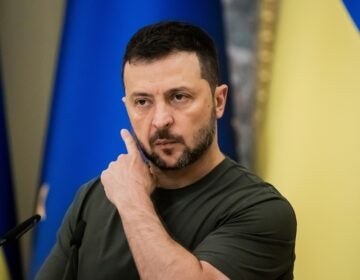Life in Russia, under the heel of Trump's hero
If you're wondering what life is really like in Russia, meet Yevgenia Albats, a Moscow-based journalist.

Dick Polman and Yevgenia Albats (UPenn Kelly Writers House)
Donald Trump has repeatedly voiced his admiration for Vladimir Putin, his ancillary campaign strategist, but if you’re wondering what life is really like in Russia, under the heel of Trump’s totalitarian hero, meet Yevgenia Albats.
A few years ago, the Moscow-based journalist noticed that the wheels on her car weren’t functioning right. She brought the car to a garage mechanic. The mechanic found a plastic bomb on her fuel tank.
“And so,” she sighed the other day, recounting the incident during a guest gig I hosted at the University of Pennsylvania’s Kelly Writers House, “this is part of life. You make your choices early in life. You can choose to write about flowers or fashion or celebrities. But if you write about politics, this is one of the risks. Journalism (under Putin) is a dangerous thing to do, but it is a very interesting life…to try to make this world a better place.”
Albats has been breaking stories in Russia since the Soviet ’80s, trying her best to function as a free and independent reporter in the American tradition — even while her colleagues have been increasingly attacked or assassinated — and she’s downright eager to dish on Putin in ways that Putin’s White House fanboy is loath to do.
Short version: “Putin is a very smart guy, and that’s why he’s so dangerous.”
From her perch in Moscow, it was obvious that Putin had multiple motives for waging cyber-war on Trump’s behalf in the ’16 campaign. He was furious about the street protests in major cities back in 2011, and, not believing that they could possibly be spontaneous (because, she says, Putin doesn’t believe in “free will”), he convinced himself that Secretary of State Hillary Clinton had orchestrated them. But, on a deeper level, he ordered an invasion of our election because he wanted to attack democracy itself.
“He wanted to create a mess, create chaos, in the West,” Albats said. “Russians have an inferiority complex about America, and he wanted to show them that there’s nothing special about the West, that every nation is corrupt, that politicians and the system in America are just as corrupt as in Russia, that there’s no such thing as ‘fair’ and ‘free’ elections…
“He grew up in the KGB, and this (strategy) is what he knows … After the Soviet Union collapsed (in 1991), when I said I was writing a book about the KGB, people said to me, ‘You should drop this, the KGB is gone. But I said, ‘No, they’re going to be back.’ And they are back.”
From their perspective, Trump was the perfect American candidate (especially given his financial ties to Russians) — as were some of the folks in his entourage, including Putin-friendly dinner guest Michael Flynn (Albats was surprised that Flynn wasn’t in the first wave of Mueller indictments) and accused money-launderer and Putin-connected consultant Paul Manafort. She wasn’t at all surprised by that indictment: “We’ve been running stories about him for 10 years,” in her Moscow magazine, The New Times. “He’s well known in Moscow and Ukraine as a very dirty guy.”
She’s convinced that there’s far more to the Manafort story than Mueller told us this week, and she hopes to pursue it. The problem is that, in Russia, it’s increasingly difficult to pursue anything. After 17 years of Putin rule, only four independent media outlets are still in business — her magazine, one newspaper, one cable TV channel, and one website. Ticking them off on her fingers, she removed her glasses and wearily rubbed her eyes. “It has been a process of slow suffocation…I don’t how long this will go on…Sometimes you feel like you cannot take it anymore.”
In Moscow, she said, “There is an atmosphere of hatred against journalists. They call us ‘enemies of the people.’ They say that we want ‘to sell Russia to the United States.’ This is going on on a regular basis, and people with unstable psyches are influenced” — as evidenced, early last week, when an unstable guy broke into a talk-radio studio and bloodied one of her colleagues with a knife wound.
There are occasional morale boosts, but not often enough: “People on the street sometimes approach me and say nice things, but so many of them are frightened. This is all part of our history. Our backpack.” Indeed, she has sent her adult daughter out of the country. “Who cares so much about safety when you’re almost 60. When you do political journalism, what’s hard is being a mom. That’s the real problem. You can’t afford the luxury of having your kid in the house…And we have yet to hit bottom. The worst is still to come.” (She was thrilled to get the Penn invite, from the Writers House partnering with the Perry World House, if only to take a break from the oppressive climate.)
Indeed, Albats is upbeat about America — about its checks and balances, and the resilience of its institutions: “There were celebrations in Moscow when Trump was elected. But today Putin’s people are very disappointed (in Trump). The expectation was that he would drop the (Obama) sanctions that have a profound financial impact on Russia, sanctions that have been extremely painful. But obviously, Trump has been very constrained in his ability to do what they expected him to do.”
Albats is also pleased that Washington Post and New York Times’ digital subscriptions are spiking, and that Trump’s poll numbers keep sliding: “This is a great country especially because of its people — as opposed to the people who run it. People here take responsibility for their country. I think it’s amazing. It’s great.”
But unlike many of her younger colleagues, who have been ground down by the oppression and pinched by dwindling incomes, she’s staying in Moscow: “I don’t believe in long-distance journalism. How is that possible, to do it from afar?” She’s determined to play it out, bombs on the fuel tank notwithstanding — hoping perhaps against hope, with characteristic Russian fatalism, to make her homeland a slightly better place.
WHYY is your source for fact-based, in-depth journalism and information. As a nonprofit organization, we rely on financial support from readers like you. Please give today.




